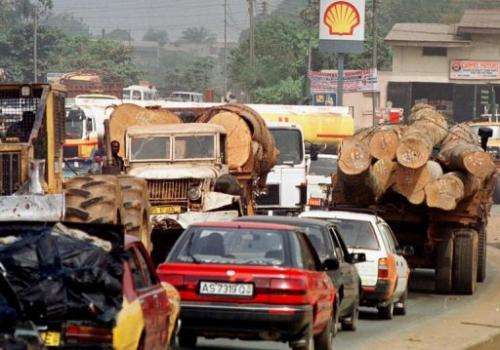West Africans turn to technology to tame the traffic beast

If you own a mobile phone and spend sunup to sundown watching the traffic pass in Ghana's capital, then Iddrisu Mohammed wants you to be his spy.
With an iPad in his hands and two phones in his pants pockets, Mohammed crisscrosses Accra on foot, looking for people to become informants for Jamless, a recently launched traffic information service that hopes to restore a little sanity to the capital's hectic commute.
"What Jamless will do is give you the traffic situation in any part of Accra that you are and give you alternate routes to use if the place is jammed," said Mohammed, who is the company's informant manager.
"You don't want to get to work late. You don't want to get home late. If you're on Jamless you know the alternative route to use to get home early."
West Africa's population has been booming, and in many cases infrastructure has failed to keep up, leaving residents of crowded big cities to grapple with impossibly congested commutes.
But a number of clever entrepreneurs and frustrated commuters have turned to social media and other technology to help drivers defy the "go-slows" that start and end the work day for many.
In Nigeria's mega-city Lagos, GidiTraffic and its over 50,000 Twitter followers keep a running log of commute catastrophes in the metropolis of some 15 million people legendary for its hours-long slogs.
And in Abidjan, commuters can send traffic information by text, Twitter or Facebook to CivRoute, a website that offers traffic conditions for Ivory Coast's main city.
The services are sorely needed as cars proliferate in these growing west African countries.
In Ghana, home to a booming economy based on exports of gold, cocoa and oil, the number of vehicles per thousand people went from 21 in 2003 to 30 in 2009, according to World Bank statistics.
But streets in cities like Accra are often undersized, under-maintained, or both. Harried commuters in the capital spare no road, be it a leafy residential street, an unfinished dirt track or a four-lane highway, in the quest to get to their home or office faster.
Before Jamless "people usually got traffic through friends, through the newspapers and usually on radio," Mohammed said. But none of those offer real-time updates as Jamless does.
Jamless was started by Guillaume Boniface, a former marketing professional for a French telecommunications company in Guinea's capital Conakry. His experience of traffic there was an all-day malaise of stationary cars, something he saw repeated when he went around the region.
"Living in Guinea, I had this idea. All African cities had this traffic issue," Boniface said, recalling traffic jams that would often degenerate into arguments between truculent drivers until the police came to break it up.
"Ghana seemed an easier country to start up."
As the company's chief executive officer, Boniface spends his time working with the country's mobile phone carriers and putting together Jamless's website in preparation for its launch in the coming months.
Jamless started small, with just a Twitter feed with a few hundred followers, through which Mohammed posts informants' tips and entreats followers for details on underserved routes.
They now offer commuters traffic updates on major routes by text message and also provide a map of the city's traffic, but they haven't started advertising those services yet, Boniface said.
Mobile phones are ubiquitous in Ghana, so Jamless relies on small-scale traders who ply Accra's streets for a constant stream of traffic updates, sent in by text.
"If there was enough (Twitter followers), then maybe, yeah, crowd-sourcing would be enough," Boniface said, referring to the practice of relying on followers for information. "Not enough people have a smartphone in Ghana yet."
If an informant sends traffic information every 20 minutes, which they do by texting a combination of numbers and characters to Jamless, they can make $20 a month, sometimes more, Mohammed said.
Though most informants give accurate tips, Boniface cross-checks traffic information with other informants in the area, and sometimes calls or visits informants if they are sending wrong information.
The biggest issue, he said, is informants not understanding how to properly text Jamless's automated system.
But tipsters keep dropping out, forcing Mohammed to walk up to 20 kilometres a day in search of the right people in the right place.
"I'll target those who are stationary," like people who sell phone airtime or fruits on busy roadways, he said. "They're always there, Monday to Sunday."
On a Friday afternoon, Mohammed had walked the length of a dusty half-finished highway, meeting with informants enthusiastic and otherwise. He came across Abdul Darmenikpui, who was weaving traditional kente cloth under a thatch shelter.
"You should bring me some money," Darmenikpui said. But the weaver hadn't made enough entries into Jamless's system to get a payment yet.
"Please keep it up," Mohammed asked Darmenikpui. "And don't stop."
(c) 2013 AFP


















